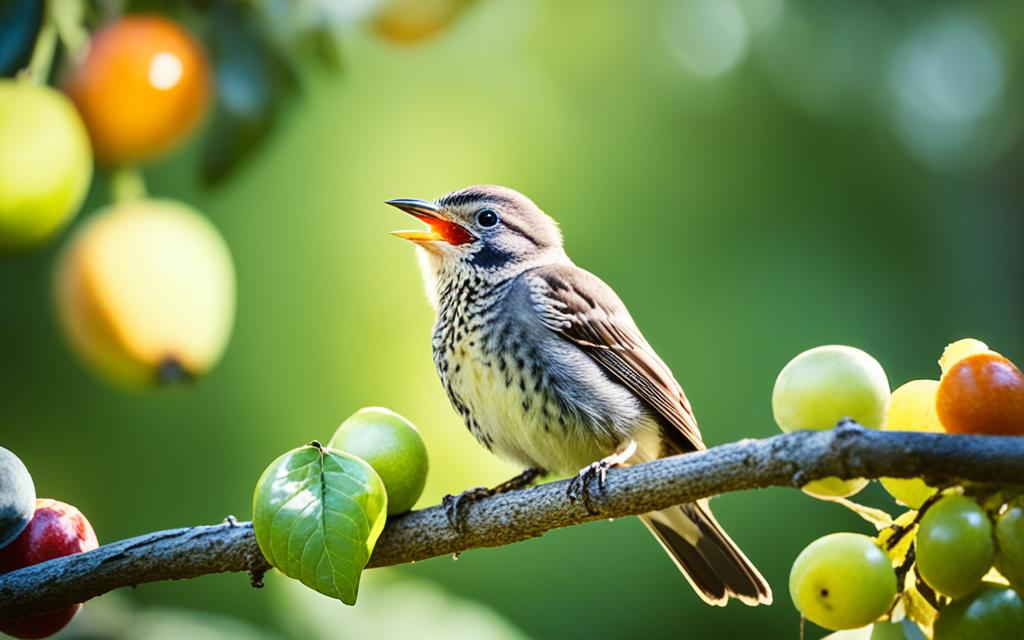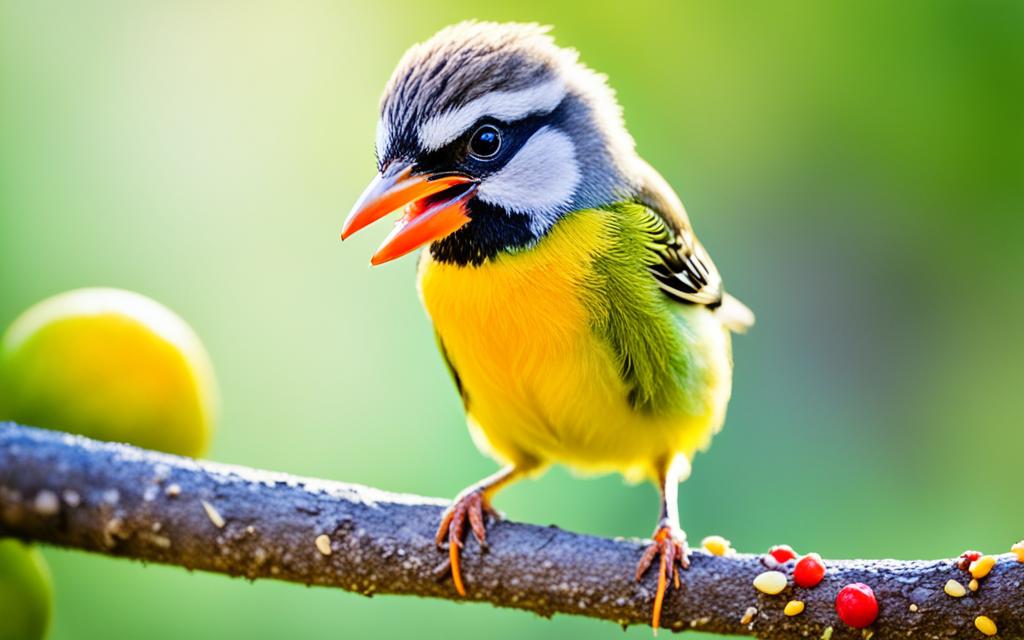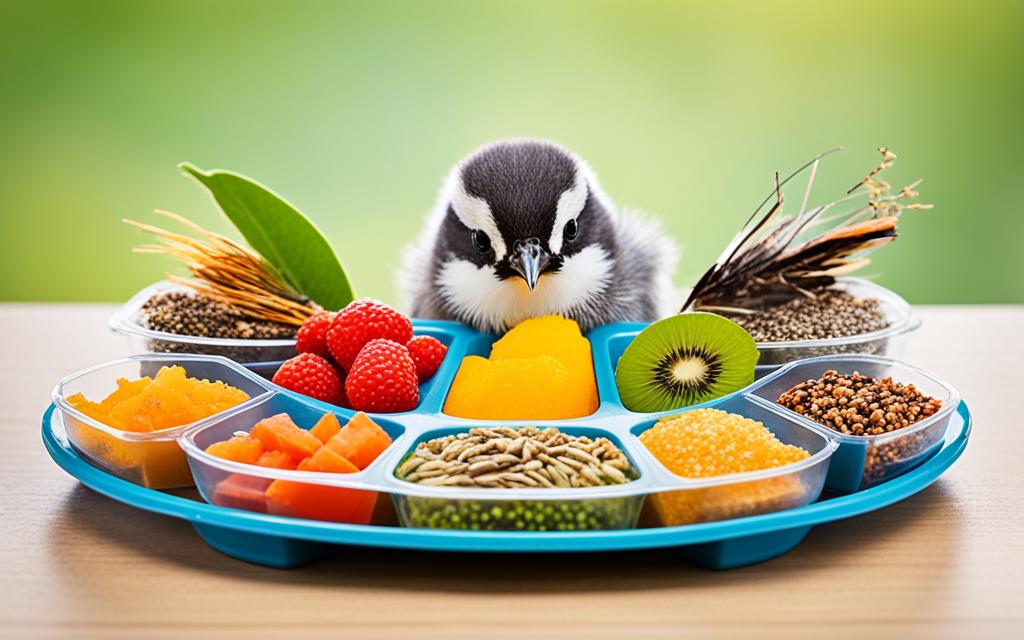Welcome to our guide on what to feed a baby bird! If you’ve found yourself taking care of a baby bird, it’s crucial to provide them with the right diet for their healthy growth and development. Feeding a baby bird can be a rewarding experience, but it’s essential to understand their specific nutritional needs to ensure they thrive.
Proper nutrition plays a vital role in the well-being of baby birds, just like it does for any other living creature. The right balance of proteins, fats, and carbohydrates is necessary to support their rapid growth and provide them with the energy they need. Whether you are caring for an orphaned bird or assisting with the feeding of a nestling, we have you covered with helpful tips and techniques.
Now, let’s dive into the details and learn more about what to feed a baby bird.
Key Takeaways:
- Feeding a baby bird requires providing a balanced diet for their optimal growth and development.
- The right balance of proteins, fats, and carbohydrates is crucial for their nutritional needs.
- Proper hand-feeding techniques are essential for ensuring the bird receives the necessary nutrients.
- Choosing the right baby bird formula is important for their specific requirements.
- Introducing solid foods gradually and following a feeding schedule helps ensure a healthy transition.
Understanding a Baby Bird’s Nutritional Needs
When it comes to baby bird care, providing proper nutrition is essential for their growth and development. Understanding a baby bird’s nutritional needs is crucial to ensure their health and well-being. In this section, we will explore the importance of feeding orphaned baby birds and the necessary balance of proteins, fats, and carbohydrates.
Feeding orphaned baby birds requires extra attention and care. These birds have unique nutritional requirements due to their circumstances. They may have been separated from their natural parent or nest at a young age, which can significantly impact their ability to survive in the wild. It is crucial to provide them with the necessary nutrients to compensate for this loss.
The Importance of a Balanced Diet
A balanced diet is crucial for the overall health and growth of a baby bird. This includes providing the right balance of proteins, fats, and carbohydrates. Proteins are essential for muscle development, while fats provide energy and support vital functions. Carbohydrates are a source of energy and help in overall growth and development.
“A balanced diet is crucial for the overall health and growth of a baby bird.”
Feeding a variety of foods can help ensure that the baby bird receives a balanced diet. Offering a combination of commercial baby bird formulas and specific fruits, vegetables, and insects can provide the necessary nutrients they need for healthy development. It is important to consult a veterinarian or avian specialist for guidance on the specific diet requirements for your baby bird species.
Special Requirements for Orphaned Baby Birds
Orphaned baby birds have unique challenges that require special attention to their nutritional needs. These birds have been separated from their parents and may lack the natural feeding and care they would receive in the wild. Therefore, it is important to provide them with appropriate care and a well-rounded diet.
“Orphaned baby birds have unique challenges that require special attention to their nutritional needs.”
When caring for orphaned baby birds, it is crucial to mimic their natural feeding habits as closely as possible. This may involve hand-feeding them using syringes or specialized feeding tools. Additionally, ensuring proper hydration is vital, as baby birds have higher water requirements than adult birds.
While feeding orphaned baby birds can be a challenge, it is a rewarding experience to watch them thrive and grow with proper care and nutrition. By understanding their nutritional needs and providing a balanced diet, you can help give these birds the best chance of survival.
Hand-Feeding Techniques for Baby Birds
Hand-feeding baby birds can be a rewarding and essential part of their care, particularly for those still in the nest. By providing nourishment directly, you can ensure that the little ones receive the nutrients they need to grow and thrive.
Feeding baby birds from the nest:
When hand-feeding baby birds from the nest, it’s crucial to approach the process with care and gentleness. Here’s a step-by-step guide on how to do it effectively:
- Prepare a suitable feeding formula: Begin by preparing a specialized baby bird formula. Look for commercially available formulas specifically designed for the species of bird you are caring for. Ensure the formula is mixed according to the package instructions, and always use warm water.
- Create a comfortable feeding environment: Find a quiet and well-lit area to feed the baby bird. It’s essential to minimize distractions and provide a calm atmosphere during feeding sessions.
- Keep your hands clean: Before handling the baby bird or the feeding utensils, thoroughly wash your hands with mild soap and warm water. This will help prevent the transmission of harmful bacteria or infections to the vulnerable bird.
- Positioning the bird: Gently place the baby bird in a comfortable position, making sure its head is elevated slightly. This position mimics how the bird would naturally be positioned in the nest for feeding.
- Feeding technique: With clean hands or a feeding syringe, carefully introduce the feeding formula into the bird’s beak. Tilt the syringe slightly to encourage the baby bird to swallow. Avoid force-feeding or overwhelming the bird with large amounts of food at once.
- Observation: Observe the baby bird while feeding to ensure it is swallowing properly and appears comfortable. Pay attention to any signs of discomfort, choking, or regurgitation, and adjust your feeding technique if necessary.
- Feeding frequency: Baby birds have high nutritional needs and often require frequent feedings. Consult a reputable source or seek advice from a wildlife rehabilitator to determine the appropriate feeding schedule for the specific bird species you are caring for.
Remember, hand-feeding baby birds can be a delicate process. If you are unsure or uncomfortable with hand-feeding techniques, it is always best to seek guidance from a professional wildlife rehabilitator or avian veterinarian.
Hand-feeding baby birds requires care and technique to ensure their proper nourishment.
Choosing the Right Baby Bird Formula
When it comes to providing the best food for baby birds, choosing the right baby bird formula is crucial. Baby birds have unique nutritional needs that require specialized formulas to ensure their proper growth and development. In this section, we will explore different types of baby bird formulas and provide guidance on how to select the most suitable option for your feathered friend.
Types of Baby Bird Formulas
There are various baby bird formulas available in the market, each catering to specific needs. Let’s take a closer look at some common types:
- Powdered Formulas: These formulas come in a powdered form that needs to be mixed with water. They are convenient and often provide a complete and balanced diet for baby birds.
- Ready-to-Use Formulas: Ready-to-use formulas are pre-mixed and require no additional preparation. They are perfect for those who prefer convenience and time-saving.
- Specialized Formulas: Some baby birds may have specific dietary requirements or health conditions that necessitate specialized formulas. These formulas often address these unique needs and provide the necessary nutrition.
Choosing the right baby bird formula depends on factors such as the bird’s age, species, and any specific dietary needs. Consult with an avian veterinarian or avian expert to determine the most suitable formula for your baby bird.
Guidelines for Choosing the Right Formula
When selecting a baby bird formula, consider the following guidelines:
- Research Trusted Brands: Look for reputable brands that specialize in avian nutrition. These brands often have extensive research and expertise, ensuring the quality and safety of their formulas.
- Check Ingredients: Review the ingredients list to ensure the formula contains a balanced combination of proteins, fats, and carbohydrates. Avoid formulas that contain artificial preservatives, colors, or flavors.
- Consider Age and Species: Different bird species have varying nutritional requirements. Choose a formula that is specifically formulated for your bird’s species and age range.
- Consult a Professional: Seek advice from an avian veterinarian or avian nutrition expert. They can provide valuable insights and recommendations based on your baby bird’s unique needs.
Introducing Solid Foods to a Baby Bird
As a baby bird grows, it becomes necessary to transition from a purely liquid diet to introducing solid food. This milestone in their development is crucial for their overall health and wellbeing. When it comes to introducing solid foods to baby birds, it’s important to do so gradually and with careful consideration.
Young birds have unique dietary needs, and introducing solid foods too early or too abruptly can be challenging for them. The key is to start the transition when the bird is ready and ensure it receives the proper nutrition to support its growth.
Here are some essential tips and guidance to successfully introduce solid foods to your baby bird:
- Choose the right foods: When selecting solid foods, opt for options that mimic a bird’s natural diet. This includes small insects, seeds, fruits, and vegetables.
- Gradual introduction: Begin by offering small pieces of food that are soft and easy to digest. You can try hand-feeding the bird or placing the food in a shallow dish.
- Observe the bird’s response: Pay close attention to how the bird interacts with the solid food. It may take some time for them to adjust, so be patient and give them time to explore and experiment.
- Provide variety: Birds, like humans, benefit from a diverse diet. Introduce a variety of foods to ensure they receive a balanced mix of nutrients.
Remember, every baby bird is different, and it may take some time for them to fully transition to solid foods. Be patient and monitor their progress closely. If you have any concerns, consult with an avian veterinarian for professional advice.
Example Meal Plan for Introducing Solid Foods
Here’s an example of a meal plan for introducing solid foods to a baby bird over a week:
| Day | Morning | Afternoon | Evening |
|---|---|---|---|
| Day 1 | Soft cooked vegetables (e.g., carrots or peas) | Fresh fruits (e.g., small pieces of apple or banana) | Small insects (e.g., mealworms or crickets) |
| Day 2 | Soaked and sprouted seeds (e.g., millet or quinoa) | Soft cooked vegetables (e.g., zucchini or squash) | Fresh fruits (e.g., blueberries or grapes) |
| Day 3 | Pellets or bird-specific baby food (consult with an avian veterinarian) | Small insects (e.g., ants or beetles) | Soaked and sprouted seeds (e.g., sunflower or flax) |
| Day 4 | Soft cooked eggs (e.g., scrambled or boiled) | Leafy greens (e.g., kale or spinach) | Soft cooked vegetables (e.g., broccoli or cauliflower) |
| Day 5 | Fresh fruits (e.g., watermelon or papaya) | Pellets or bird-specific baby food (consult with an avian veterinarian) | Small insects (e.g., fruit flies or waxworms) |
| Day 6 | Soft cooked grains (e.g., rice or oats) | Soft cooked eggs (e.g., scrambled or boiled) | Leafy greens (e.g., dandelion greens or parsley) |
| Day 7 | Soaked and sprouted seeds (e.g., hemp or chia) | Fresh fruits (e.g., mango or kiwi) | Pellets or bird-specific baby food (consult with an avian veterinarian) |

Remember to consult with a qualified avian veterinarian for specific advice tailored to your baby bird’s species and individual needs. They can provide valuable guidance on when and how to introduce solid foods to ensure your feathered friend thrives and grows into a healthy adult bird.
Feeding Schedule for Baby Birds
Establishing a regular feeding schedule is crucial for the proper nourishment and growth of baby birds. Providing them with consistent meals helps ensure they receive the necessary nutrients to thrive. The baby bird feeding schedule may vary depending on the bird’s age and species, as their dietary needs change as they develop.
Here is a sample feeding schedule to guide you in feeding baby birds:
| Age | Feeding Frequency |
|---|---|
| 0-1 week | Every 1-2 hours |
| 1-2 weeks | Every 2-3 hours |
| 2-3 weeks | Every 3-4 hours |
| 3-4 weeks | Every 4-6 hours |
| 4-5 weeks | Every 6-8 hours |
It’s important to note that these are general guidelines, and your specific circumstances may require adjustments. Always observe the baby bird’s behavior and consult a wildlife rehabilitator or avian veterinarian for expert guidance.
Remember to follow these essential tips for feeding baby birds:
- Prepare the formula according to the instructions provided by the manufacturer.
- Use a syringe or a specially designed baby bird feeding tool to administer the formula.
- Ensure the formula is at the correct temperature, usually warm but not hot.
- Feed the baby bird until it is full but not overfed.
- Monitor the bird’s weight and development regularly.
In addition to the feeding schedule, it’s essential to maintain proper hygiene throughout the feeding process. Always clean the feeding equipment thoroughly after each use to prevent the growth of harmful bacteria.
“Establishing a consistent feeding schedule is essential for the healthy development of baby birds. Providing them with the right amount of food at regular intervals ensures they receive the nourishment they need to grow strong.”
By following a feeding schedule that suits your baby bird’s needs, you can contribute to its overall health and well-being. Remember, proper nutrition is vital for these delicate creatures as they transition from being dependent on their parents to becoming independent flyers.
Supplementing a Baby Bird’s Diet
Supplementing your baby bird’s diet with additional nutrients and vitamins is an essential part of ensuring their optimal health and growth. While providing a balanced diet is important, sometimes there may be specific nutritional needs that require extra attention. Let’s explore when and how to use supplements to support your baby bird’s well-being.
When it comes to choosing supplements for your baby bird, it is crucial to consult with an avian veterinarian. They can assess your bird’s specific dietary requirements and recommend the most appropriate supplements. Remember, each bird species may have different nutritional needs, so it’s essential to seek professional guidance.
One common supplement used for baby birds is a multivitamin. This type of supplement can help ensure your bird is receiving all the necessary vitamins and minerals for healthy growth. It is typically administered in liquid form and can be mixed into their formula or added to their food. The dosage and frequency should be determined by your avian veterinarian.
In addition to multivitamins, specific supplements may be necessary to address particular deficiencies or health conditions. For example, calcium supplements can be given to birds that require additional calcium for bone development. Probiotics can help promote a healthy digestive system, while omega-3 fatty acids can support brain and eye development.
It is important to understand that supplements should never replace a balanced diet. They should be used as a complementary measure to ensure your baby bird’s nutritional needs are met. Always follow the guidance of your avian veterinarian and provide the appropriate dosage and frequency for the specific supplement.
“Supplementing your baby bird’s diet with additional nutrients and vitamins is a crucial step in promoting their overall health and well-being.”
Supplement Safety Measures
When using supplements for your baby bird, it is essential to follow proper safety measures to avoid any potential harm. Here are a few important points to keep in mind:
- Always use supplements specifically formulated for birds.
- Read and follow the instructions provided with the supplements.
- Store supplements in a cool, dry place to maintain their effectiveness.
- Check the expiration date before administering any supplement.
- Do not exceed the recommended dosage without consulting your avian veterinarian.
- Observe your baby bird for any adverse reactions or changes in behavior after supplement administration. If you notice anything concerning, contact your avian veterinarian immediately.
By following these safety measures, you can ensure that supplementing your baby bird’s diet is done in a responsible and beneficial manner.
“Proper supplement usage, along with a balanced diet, can help support your baby bird’s growth, development, and overall health.”
Frequently Asked Questions about Feeding Baby Birds
Feeding baby birds can be a rewarding experience, but it can also raise many questions and concerns. In this section, we address some of the most common FAQs about feeding baby birds, providing expert answers and advice to help you navigate this important task.
1. What should I feed a baby bird?
When feeding a baby bird, it’s crucial to provide a diet that closely resembles what it would eat in the wild. The diet should consist of a balanced mix of proteins, fats, and carbohydrates. Commercially available baby bird formulas, specially designed for their nutritional needs, are often the best option. It’s important to note that not all birds have the same dietary requirements, so consult a wildlife rehabilitator or avian veterinarian for specific recommendations.
2. How often should I feed a baby bird?
The frequency of feedings depends on the bird’s age and species. In general, young hatchlings require frequent feedings every 15 to 30 minutes. As the bird grows, the feeding frequency gradually decreases. It’s essential to follow a consistent feeding schedule to ensure the bird receives enough nourishment for healthy growth and development.
3. Can I feed a baby bird water?
While it’s important for baby birds to stay hydrated, offering water directly can be challenging and may pose a risk of aspiration. Instead, provide moisture-rich foods such as fruits or vegetables, which can help meet their hydration needs.
Expert Tip: “A shallow dish of water placed near the baby bird’s feeding area can also help with hydration. Just ensure the water is shallow enough to prevent drowning.”
4. How do I know if a baby bird is getting enough food?
Monitoring the baby bird’s weight gain and overall energy levels is an excellent way to assess if they’re receiving enough food. Regular visits to an avian veterinarian or wildlife rehabilitator can provide professional guidance and ensure the bird’s health and wellbeing.
5. Can I feed a baby bird insects?
If the baby bird is an insectivore species, such as a robin or a finch, introducing small, soft-bodied insects like mealworms or crickets can provide additional nutrients and encourage natural feeding behaviors. However, it’s crucial to ensure that the insects are safe and suitable for the bird’s age and species.
Expert Tip: “When offering insects, it’s essential to avoid using pesticides or insects that have come into contact with harmful substances, as this can pose a danger to the baby bird.”
6. How do I transition a baby bird to solid foods?
As the baby bird grows and develops, it’s essential to introduce solid foods gradually. Start by offering small pieces of soft fruits, vegetables, or soaked pellets. Monitor their reaction and adjust the size and texture of the food accordingly. Properly transitioning to solid foods will help the bird develop healthy eating habits.
7. Can I feed a baby bird baby food?
Baby food can be suitable for some baby birds as a temporary solution, as long as it does not contain any additives or preservatives that may be harmful to them. However, it’s important to remember that baby birds have specific nutritional needs, and a specialized baby bird formula is usually the best option.
8. What if the baby bird refuses to eat?
There can be various reasons why a baby bird may refuse to eat. It could be due to stress, illness, or discomfort. If a baby bird consistently refuses to eat, it’s crucial to seek professional advice from a wildlife rehabilitator or avian veterinarian for proper evaluation and assistance.
9. Can I release a baby bird after feeding it?
Releasing a baby bird requires more than just feeding. It’s crucial to ensure that the bird can fend for itself and has the necessary skills for survival. Before releasing, consult with a wildlife rehabilitator or avian veterinarian to determine if the bird is ready for the wild.
10. Where can I find professional help for feeding baby birds?
If you have any concerns or need professional assistance in feeding baby birds, contact your local wildlife rehabilitator or avian veterinarian. These experts have the knowledge and experience to provide proper guidance and care for baby birds in need.
Remember, each baby bird is unique, and it’s essential to tailor their feeding routine to their individual needs. By following expert advice and providing the right nutrition, you can contribute to the healthy development of these young and vulnerable creatures.
Tips for Encouraging Healthy Eating Habits in Baby Birds
When it comes to nurturing baby birds, establishing healthy eating habits is crucial for their overall well-being. By providing a nutritious and diverse diet, you can ensure they grow into strong and vibrant adults. Here are some practical tips and strategies to encourage healthy eating habits in baby birds:
- Offer a variety of foods: Just like humans, baby birds benefit from a balanced diet that includes a variety of foods. By introducing different types of seeds, fruits, vegetables, and protein sources, you can keep their diet interesting and provide essential nutrients.
- Practice portion control: Baby birds have small stomachs, so it’s important to offer them appropriate portion sizes. Providing too much food at once can lead to overeating and potential health issues. Monitor their intake and adjust the portions accordingly.
- Introduce new foods gradually: Baby birds may be hesitant to try new foods, especially if they have been predominantly fed a certain type of diet. To expand their palate, introduce new foods gradually, mixing them with familiar ones. This will help them adjust and develop a taste for different flavors.
- Observe their preferences: Each baby bird may have its own preferences when it comes to food. Take note of what they enjoy eating the most and incorporate those foods into their diet more frequently. Variety is important, but catering to their preferences can also ensure they are getting adequate nutrition.
Ensuring a Healthy Diet with a Nutritional Chart
In order to provide a visual reference for bird owners, here’s a nutritional chart showcasing the different food groups and their benefits for baby birds:
| Food Group | Nutritional Benefits |
|---|---|
| Seeds | Provide essential fats, proteins, and carbohydrates for energy and growth. |
| Fruits and Vegetables | Offer vitamins, minerals, and antioxidants for overall health and immune support. |
| Protein Sources | Include insects, cooked eggs, and small amounts of lean meat for muscle development and feather quality. |
| Calcium-rich Foods | Ensure strong bones and beak development. Examples include cuttlebones and calcium supplements. |
By following these tips and utilizing the nutritional chart, you can take proactive steps in promoting healthy eating habits for your baby birds. Remember, a well-balanced diet is the foundation for their growth, vitality, and long-term health.

Conclusion
Providing a balanced and nutritious diet is crucial for the health and well-being of baby birds. Throughout this article, we have explored the essentials of nourishing a baby bird, from understanding their nutritional needs to hand-feeding techniques and introducing solid foods.
Remember, when feeding a baby bird, it’s important to choose the right formula and follow a consistent feeding schedule based on their age and species. Supplementing their diet with additional nutrients and vitamins can also contribute to their optimal growth and development.
By encouraging healthy eating habits, such as offering a variety of foods and introducing new ones gradually, you can foster a positive relationship with food for your feathered friends. Remember, providing a loving and caring environment along with a nutritious diet is key to their overall well-being.
FAQ
What should I feed a baby bird?
A baby bird’s diet should primarily consist of a commercial baby bird formula, specifically designed to meet their nutritional needs. It is important to consult a veterinarian or avian specialist for guidance on the specific brand and type of formula suitable for your baby bird.
How often should I feed a baby bird?
The frequency of feeding depends on the age and species of the baby bird. In general, baby birds need to be fed every 1 to 2 hours during daylight hours. As they grow older, the feeding frequency can be gradually reduced. It is essential to establish a feeding schedule in consultation with a veterinarian or avian specialist.
Can I hand-feed a baby bird?
Yes, hand-feeding can be necessary if the baby bird is orphaned or has been abandoned by its parents. Hand-feeding requires special techniques and proper training to ensure the bird’s safety and proper nutrition. It is recommended to seek guidance from a veterinarian or avian specialist before attempting to hand-feed a baby bird.
When can I introduce solid foods to a baby bird’s diet?
The introduction of solid foods depends on the bird’s age and species. Typically, this process starts when the baby bird is around 4 to 6 weeks old and showing signs of being able to feed on its own. Consult a veterinarian or avian specialist to determine the appropriate time to start introducing solid foods to the baby bird’s diet.
How do I choose the right baby bird formula?
Choosing the right baby bird formula is crucial for their nutritional needs. Consult a veterinarian or avian specialist to determine the formula that best suits the species and age of your baby bird. They will be able to guide you on selecting a reputable brand and provide instructions on preparation and feeding.
Can I supplement a baby bird’s diet with additional nutrients?
Supplementing a baby bird’s diet may be necessary in certain cases, but it should be done under the guidance of a veterinarian or avian specialist. They can prescribe the appropriate supplements and advise on the proper dosage to ensure the baby bird’s nutritional needs are met without causing any harm.
How can I encourage healthy eating habits in baby birds?
Encouraging healthy eating habits in baby birds involves offering a variety of foods, introducing new foods gradually, and providing appropriate portion sizes. It is essential to consult a veterinarian or avian specialist to ensure you are feeding the right foods in the correct manner to promote healthy growth and development.
What are some common challenges in feeding baby birds?
Common challenges in feeding baby birds may include difficulty transitioning to solid foods, refusal to eat, or improper feeding techniques. It is important to seek professional advice from a veterinarian or avian specialist to address these challenges and provide the necessary support for the baby bird’s well-being.








